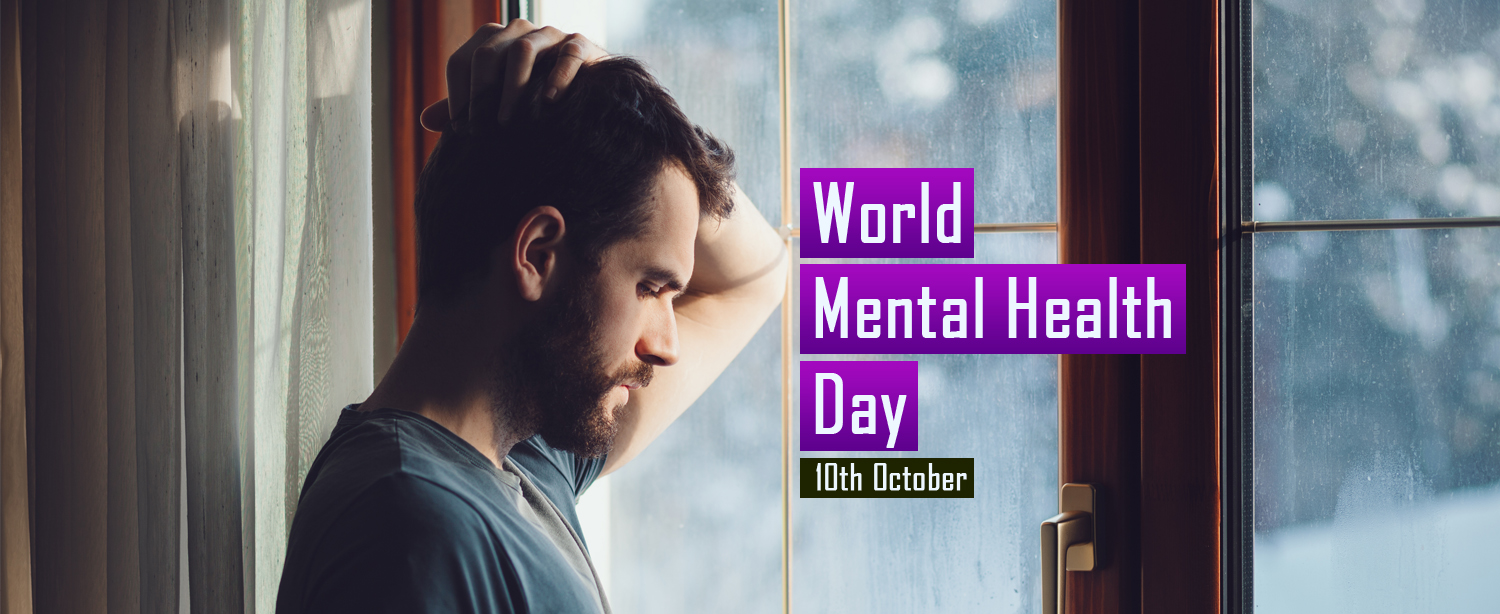Feeling very low or disturbed? Extreme mood changes, feelings of anger, worry or guilt are not normal. These need to be discussed with your doctor. Mental illness affects 1 out of every 7 Indians. According to the World Health Organization, 56 million Indians suffer from depression and another 38 million Indians suffer from anxiety disorders. Your emotional, psychological, and social well-being all make up your mental health and impact the way you think, feel, and act.
The theme for 2021 ‘Mental Health in an Unequal World’ wants the world to focus sufficiently on health beyond physical health. The pandemic has caused an immense impact on the mental health of people across age groups as well as disrupted the existing mental health services too. Let us come together and increase the awareness around mental health and the importance of seeking timely medical care. Early identification of symptoms and prompt medical assistance can help reduce the severity of a mental illness.
Types of Mental Disorders
The term “mental disorders” is used to describe a wide range of mental and behavioural illnesses that appear in various ways. They are generally characterised by a combination of abnormal thoughts, emotions, perceptions, behaviour and relationships with others. Disorders can range from mild to severe and can affect people of every sex, age, gender, ethnicity, or socioeconomic group. Here are some of the most frequent mental illnesses:
- Depression:
Chronic depression is a debilitating illness that usually reoccurs throughout a person’s lifetime. Symptoms include fatigue, lack of concentration, changes in appetite and thoughts of suicide. Some other forms of depression include seasonal affective disorder and postpartum depression. - Autism Spectrum Disorder (ASD):
General disorders on autism include autistic disorder, Asperger’s syndrome and atypical autism. - Schizophrenia:
Schizophrenia is a serious mental illness that can cause people to have delusions, hallucinate or show no emotion at all. - Bipolar Disorder:
Bipolar disorder is one of several mood disorders that leave people with emotions swinging from very high (manic) to hazardously low (depressive). - Anxiety Disorders:
Anxiety disorders are the most common mental health condition and include OCD, panic attacks and phobias. - Eating Disorders:
Bulimia nervosa, anorexia nervosa, and binge-eating disorder are marked by extreme behaviours, which usually are rooted in complex biological and psychological causes.
Symptoms of Mental Disorders
Medical research suggests that early intervention can help minimize or delay the symptoms, prevent hospitalization and improve the prognosis of mental health conditions. Here are some signs that need further medical investigation:
- Withdrawal from friends and family
- Extreme and long-lasting sadness
- Loss of interest in things you used to enjoy
- High and low extremes of emotion
- Big changes in sleeping or eating habits
- Excessive anger
- Drug or alcohol abuse
Mental Disorders – Myths & Facts
Here are some common myths and facts that mislead people. Ask questions, know the facts, consult medical experts if needed:
Myth: Children don’t experience mental health problems.
Fact: That is not true, very young children may also show early warning signs of mental health disease. They are often clinically diagnosable and occur due to biological, psychological, and social factors.
Myth: People with a mental illness cannot have a job.
Fact: People with mental health disorders are as productive as other employees. In fact, they report good attendance and punctuality as well as excellent motivational levels.
Myth: Mental health disorders last a lifetime.
Fact: A good treatment plan helps you work through the problem and recover. This doesn’t necessarily mean that the problem has gone away. But you can definitely manage it better and live an improved life.
Myth: Mental health problems are a sign of weakness.
Fact: Mental illness has nothing to do with your physical or emotional strength or weakness. It is a medical disorder that needs treatment, in the same way, infection or fracture would.
Myth: Psychiatric medications are bad.
Fact: Many people believe that psychiatric medicine is harmful. Just like any other detrimental medical condition, mental illness requires medication. Regular therapy combined with medication can greatly improve one’s quality of life.
Treatment at Kokilaben Dhirubhai Ambani Hospital
It is important to understand that mental health conditions such as depression, anxiety and chronic stress frequently necessitate specialised therapy and treatment. These disorders may worsen over time if you don’t get help right once, and they can have a significant negative impact on your health and quality of life.
Highly trained and experienced specialists at our Department of Psychiatry offer therapeutic and counselling services to people with mental health disorders. Our skilled team use a variety of tried-and-tested therapy approaches to help you overcome mental health difficulties, minimise symptoms, and take steps toward a robust and long-term recovery. All treatment is individually tailored according to your unique needs and requirements, allowing us to achieve the best potential post-treatment results. Please visit our website for further information: https://www.kokilabenhospital.com/departments/clinicaldepartments/psychiatry.html


